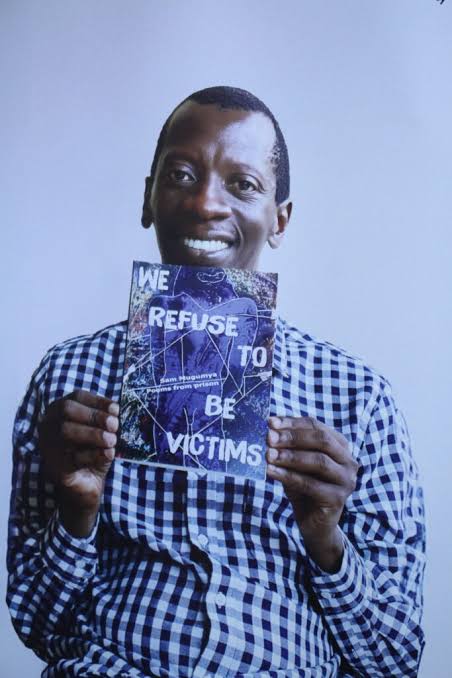One of the most celebrated Poets Robert Frost opined that “Poetry is when an emotion has found its thought and the thought has found words”, I agree and subscribe to that opinion by Frost. This is to say, whilst reading Mugumya’s poetry I discovered that the budding poet was looking for an escape and poetry was the right pulpit to speak to himself, his immediate audience – the inmates – his defiance, the Uganda populace, and his perpetrators. It should be noted that his collection plays a critical role at raising awareness of the ongoing injustice meted to different dissents in his country, Uganda. That his poetry is an emotion in thought, and thought finding itself in words.
During the savoring of this debut poetry collection of Mugumya I noted quite a number of emotions beginning with the front cover. The illustrator Gabriele Schnitzenbaumer blended colors according to the emotions of the content in the book, and the plight suffered by the poet in the Prison Militaire de Ndolo. On the front cover, there is a figure that looks like a naked man – this is noticed because of something that looks like a phallus between the figure’s thighs. The figure is gyved with ropes/chains and at the extreme sides of the body (left and right), I see fingers of individuals pulling the ropes/chains to inflict pain – I presume. This is a reflective cover that signals/symbolizes brutality and oppression. In quasi-democracies and authoritarian environments, it has been recorded by different victims that there is sexual violence meted by the oppressors to the many victims – many times the victims are undressed and their sexual organs are “defiled” as a concept of torture to kill their spirits, honor and mutilate their possibility of reproduction. For instance, per Kakwenza’s revelation in his memoir “The Savage Avenger” in the dungeons of Mbuya Military Barracks, he shares his plight where he allegedly says his manhood was “defiled” by his captors. He further shares the obsession of his abusers with the size of his phallus – that it had to be measured to see how long or “tall” it looked. Furthermore, during the peaceful protests of 2024 organized by young people – the youths in Uganda – there was an alleged criminal offence aired on X (formerly Twitter) of the rape allegations – it is believed that the young man was sodomized. Therefore, I do believe the infamous prison to which Mugumya spent 8 years suffering and away from home treated him “nakedly” as depicted at the front cover in the chains of injustice, perhaps whilst in that prison there was water boding, body shaming and sexual harassment – we live to know that from Sam what truly befell him in the prison walls of Militaire de Ndolo – perhaps, we shall hear or read a story so vivid like Jack Mapanje’s Scrubbing the Furious Walls of Mikuyu. Where Mapanje narrates the ordeal he faces whilst dissenting, and he openly thinks aloud how the rebels are treated inhumanely under captivity.
Besides the curious front cover, I dug into a forward by Dr. Olive Kobusingye, an impeccably stellar nonfiction writer that wrote one of the most tough and courageous books called “The Patient”. I have shared a WhatsApp group before with the good doctor, and I must assert that I admire her charisma when it comes to being bold and blunt whilst writing about the situation in Uganda especially in the Health Sector. As I would quote from Simon Kaggwa Njala whilst he was interviewing the Minister of Finance Matia Kasaija; “the health sector in Uganda is sick”, and true Dr. Kobusingye navigates the tough truth without fear of any possible ramification from her government that around 2023, her books where pounded and confiscated by the government but her spirit never withered. However, I disagree with the good doctor that Mugumya’s poetry is an anthology. The difference between an anthology and collection has been misrepresented by different individuals – there is a huge difference between the two and I am quite certain that Mugumya’s content is not an anthology but a poetry collection. What is an anthology in this general standard? We would think that Mugumya has had about different bodies of work, possibly including poetry, novels and memoirs that all these are arranged, collected together – a compilation – many times an anthology is done by another individual, possibly a lover of Mugumya’s work. Whilst a poetry collection is majorly one particular genre called a collection of poetry by Mugumya Sam. The argument of what is an anthology of poetry and poetry collection has always been contested by several scholars but conclusively there is no aorta of thought that Mugumya’s content qualifies to be an anthology – that was a mishap by the good doctor. On the other side of the coin, Dr. Kobusingye represents the entire body of work well, she remonstrates on behalf of Mugumya and all other political prisoners who rot in the dungeons of oppression and suffering. Many times, we misrepresent suffering and think, that suffering is only physical – where pain is inflicted on the body through; picking of the skin with a pair of pliers, whips for flagellation against the backs of men/women, nail plucking et al. the mental or emotional suffering has been left unsaid as the victims struggle with PTSD. This is what I witness when I read Mugumya’s “You Will Not Be There”.
Women make men, women break men – a contradicting 50/50 saying. Whilst reading Mugumya’s story of the heartbreak in lines, I noted a lonely man in prison thinking positively about the slow-moving time in prison because of optimism. That out of prison, lies a woman so precious that time itself fails to understand her beauty. Like Rodion Romanovich Raskolnikov of Fyodor’s Crime and Punishment, Mugumya clung on the mysteries of love to pass through the filthy conditions of prison time. For Raskolnikov, Sonya – a prostitute – persevered and became the moral strength for him during his prison rehabilitation – where she waited for him, and time became a future where Raskolnikov will live happily with Sonya – here I think, Sonya made Raskolnikov. On the other note, Mugumya’s love story is a complex love metaphor where revolutions supersede the needs of men and women – that waiting and patience is a doctrinal implant that moves hand-in-hand with availability. I believe, the persona described here, is a woman who truly loved Sam but time passed-by and hope was lost because Mugumya was imprisoned far away from his home country. That the poor woman had to make a personal choice and move on – painfully, I presume. This is the emotional suffering I think that is always neglected. For Mugumya concludes on this important poem by saying; //Memories are all that I retain. //
As Phaedrus the person behind the idea of talking about love, he posited that love offers the best goods and guidance. Many times, memories however small they could be could guide us into the turbulent times especially in prison. Love in the days of prison could be a wary concern to many inmates, it can drive man mad to insanity but I am glad Mugumya held onto the good memories until he was set free. A sign of steadfast heart that lingers through a storm of emotions and pulls himself together even after a heartbreak. May Cupid strike again in his favor.
“If you don’t stand for something, you will fall for anything.” A quote by Malcom X about strong convictions. I read Mugumya’s poem “We Refuse to be Victims” and that quote was ringing deep into my brain. Mugumya shares a strong spirit of endurance in this poem, where he encourages people never to pity them, but to carry on the burning candle of revolution to liberation. He opines in this poem; //Our chains condemn his conscience. //, a strong, deep line that relishes curiosity in me. This is to say, according to Buddhism, conscience is about good and bad – how it reflects on your spiritual journey and how karma catches up with our actions. However, many times conscience never puts into consideration the objectivity of reality. Here is Mugumya, a young-abled-man flummoxed about the worrying conditions of human dignity in Uganda, and the incumbent flummoxed about a young and vibrant young man, a threat to his power. Here the conscience of good and bad; right and wrong creates a perplexity. Furthermore, Marcus Aurelius joins the debate of conscience by saying; “To move from one unselfish action to another with God in mind. Only there, delight and stillness … the only rewards of our existence here are an unstained character and unselfish acts.” Here, I think is where Mugumya lies in his action. Sam moves beyond his comfort zone, puts up a spirited fight for liberation, he is imprisoned in a foreign country, loses his lover but his spirit continues to soldier on. He lives by the rational principles of understanding individual responsibility of liberation to “Zion”. He mobilizes his readers/audience to hearken to Marley’s revolution of peace, freedom, and the fight against injustice. To me that is a conscience to understand what is right and wrong, and I subscribe to this poetic drum-roll to us all.
In the nutshell, during the French revolution literature played a very vital role. Therefore, literature like Mugumya Sam’s poetry collections offer enlightenment, romanticism and revolutions. The increasing published body of works about social transformation is a strong message that there is a growing conscience amongst peoples of various types. I must say, Mugumya is a promising piece of work that needs some polishing and he is good to go as a political poet. I strongly recommend this book to revolution lovers of conscience.
This post was created with our nice and easy submission form. Create your post!






